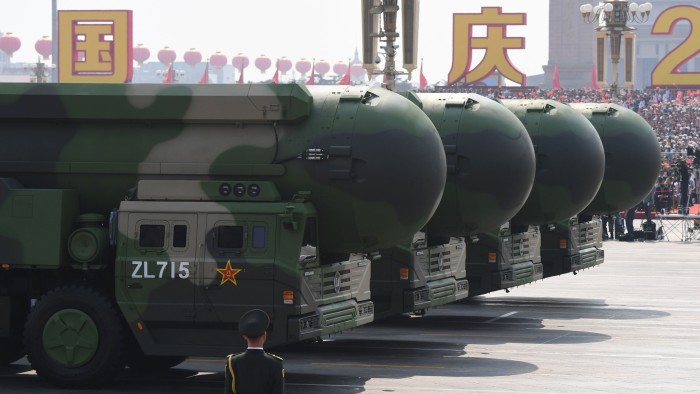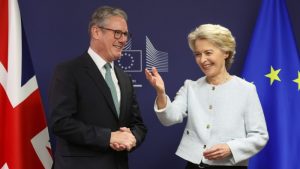US nuclear build-up would not help deter China from using atomic weapons in Taiwan, war game finds

A further build-up of US nuclear capabilities would have little effect on whether China might resort to using nuclear weapons in a war over Taiwan, the first large-scale unclassified war game on such a scenario has found.
A growing number of US experts have recommended Washington acquire more nuclear capabilities, possibly including new tactical weapons, in a sign of an incipient nuclear arms race with Beijing.
But the tabletop exercise, conducted by the Washington-based Center for Strategic and International Studies and a war gaming lab at the Massachusetts Institute of Technology, suggested a build-up beyond current modernisation plans would not strengthen nuclear deterrence in a conflict over Taiwan.
The war game did not seek to assess how likely it was for China or the US to resort to nuclear weapons, but examined which military situations might make either Chinese or American battlefield commanders seek their use in a hypothetical Taiwan war in 2028 and how that would change its further course.
War games of this type mainly test strategies and capabilities by having teams of military officers, government officials or experts simulate conflicts by acting as opposing parties using computer models, gameboards and discussions.

The CSIS and MIT war game was conducted amid debate over how Washington should react to the modernisation and expansion of China’s nuclear forces, discussion that has been fuelled by fear of possible joint military action with Russia and by Moscow’s nuclear posturing over the Ukraine war.
For decades, China focused on securing the ability to retaliate against any enemy nuclear strike, without seeking parity with the world’s two leading nuclear powers.
However, the Pentagon estimates that Beijing will by 2030 double its arsenal of operational warheads from more than 500 last year. Other experts put the number at about 440. The People’s Liberation Army can also now launch nuclear weapons from submarines as well as aircraft, road-mobile vehicles and missile silos.
US experts have argued that increasing nuclear capabilities could make up for a potential shortfall in conventional munitions. They have suggested the deployment of new tactical nuclear weapons that could target enemy forces on the battlefield, possibly including nuclear-armed submarine-launched cruise missiles (SLCM-N), a type of weapon the US withdrew at the end of the cold war.
However, the multiple iterations of the war game suggested such capabilities were not needed.
“The US has 600-plus tactical nuclear weapons, and it is modernising their delivery means,” said Eric Heginbotham, an expert on Chinese nuclear issues at MIT and one of the report authors.
“In the game, the one US team that employed tactical nuclear weapons used fewer than a dozen,” Heginbotham said. “In no cases did any of the participants ever say: ‘We need SLCM-N or some other system that is not in the inventory or being deployed under the current modernisation plan.’”
CSIS and MIT said that when deciding on whether to use nuclear weapons, teams playing China had not perceived any constraints on the US ability to itself deliver such weapons.
The authors concluded that US policymakers should not “develop additional nuclear weapons for a conflict with China beyond current nuclear modernisation plans” and “not pursue quantitative nuclear superiority in the expectation that it would deter China from using nuclear weapons”.
In the multiple iterations of the war game, the greatest pressure for nuclear use came when teams playing China faced defeat in their invasion of Taiwan, underlining US concerns that Beijing may be watering down its pledge to never use nuclear weapons first. The exercise also indicated that escalation paths for a conflict gone nuclear were unpredictable.
“Favourable outcomes were possible, but total victory was unachievable,” CSIS and MIT said in their report.

The results differed starkly from simulations of a conventional Taiwan conflict published by CSIS last year that did not give either side the option to use nuclear weapons.
While that exercise pointed to a decisive US victory as the most likely result, only five of 15 iterations of the nuclear game ended with a withdrawal of the PLA. Four of those were cases where neither side used nuclear weapons.
A US team was first to use nuclear weapons in only one iteration.
In one iteration, Taiwan returned to its prewar status after the US hit PLA forces on the island with tactical nuclear weapons following Chinese nuclear strikes on Taiwanese troops. Three other iterations led to the nuclear annihilation of Chinese and US cities, claiming hundreds of millions of lives. This happened after one side retaliated with strikes on the other’s homeland following initial nuclear attacks on its own forces.
Five more iterations ended with a PLA foothold on Taiwan after nuclear weapons were used. One iteration remained inconclusive.
The authors urged the US to work with allies and partners to evaluate what concessions could be offered during a Taiwan war to allow China to back down instead of resorting to a nuclear option.
There were “many examples” of past crises being settled with such “off-ramps”, said Mark Cancian, a senior adviser with the Defense and Security Department at CSIS and another co-author.
As part of the resolution to the Cuban missile crisis, “the United States secretly agreed to withdraw its nuclear missiles from Turkey”, noted Cancian. “That gave [Nikita] Khrushchev a face-saving win, but it didn’t cost the United States very much.
“In that situation, there was time to develop an off-ramp,” he added. “Our concern is that time will not be available when nuclear weapons are used. That’s why it’s important to think through off-ramps ahead of time.”
China has repeatedly dismissed US concern about the development of its nuclear forces, saying Washington uses it as a pretext to expand its own nuclear arsenal in pursuit of “absolute strategic predominance”.
“It is the US who is the primary source of nuclear threats and strategic risks in the world,” Chinese foreign ministry spokesperson Mao Ning said in August.
Data visualisation by Aditi Bhandari and Ian Bott
#nuclear #buildup #deter #China #atomic #weapons #Taiwan #war #game #finds





